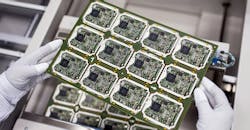Texas Instruments Tightens Grip as Global Leader in Analog ICs
Texas Instruments tightened its grip over the global market for analog semiconductors that serve as fundamental building blocks in every electronic system ranging from smartphones to cars in 2019, holding nearly double the market share of Analog Devices, its closest rival in the $55 million segment, according to a report by market research IC Insights.
Texas Instruments said sales in its core analog chip business slipped slightly to $10.2 billion last year as it struggled to restart demand for its products. But according to IC Insights, the company's sales declined at a slower rate than many of its rivals, boosting its market share to 19% in 2019. Analog Devices was the world's second largest analog IC vendor last year, with 10% of global market share, its position unchanged as its sales dipped to $5.2 billion.
Overall, the top 10 vendors command around 62% of the $55.2 billion market for analog semiconductors, up from about 60% of the global market in 2018, according to IC Insights.
Texas Instruments cemented its status as the world's top analog chip manufacturer last year, with analog sales that accounted for 75% of its $13.7 billion in total chip revenue. The company's analog IC sales were more than 10 times those of the tenth largest vendor, Renesas Electronics. It also leaped out ahead of the largest chip vendors in Europe—Infineon, ST and NXP Semiconductors—which together control 18% of the market share.
The company struggled with declining demand for its analog and other chips last year as the global economy slows down and electronics manufacturers faced the fallout of the US trade war with China. Uncertainty over trade policy also made its customers more cautious and convinced them to push out orders for analog chips into the future. Texas Instruments has 14 production plants around the world that roll out tens of billions of chips each year.
Texas Instruments has the longest list of customers and the broadest range of products in the global chip business, making it significantly more diversified than other vendors in the semiconductor space, including Intel, Qualcomm, and Broadcom. That protects it against any single point of failure in its business. Texas Instruments, which is seen as a barometer for overall chip demand, sells around 80,000 products to more than 100,000 customers.
Many of its most popular components stay in use longer than other types of chips before becoming obsolete. Texas Instruments said on its quarterly earnings call in January more than 40% of its overall business comes from chips that have been in production for 10 years or more. Moreover, its top 10 products accounted for only 5% of its sales last year. The firm said its 100th largest product line represents only one-tenth of one percent of its revenue.
Texas Instruments has widened its dominance over the analog IC market in recent years. The chips it sells are targeted at automobiles (or 21% of its core analog chip business last year), smartphones and other consumer electronics (23% of its overall analog sales), and industrial (36% of analog sales). These are highly profitable markets that TI's management believe afford it the best opportunities for growth now and into the future, said IC Insights.
Sales of chips slapped on cars and factory equipment accounted for 56% of the company's core analog chip business in 2019, up from 46% half a decade ago, according to IC Insights.
About the Author
James Morra
Senior Editor
James Morra is the senior editor for Electronic Design, covering the semiconductor industry and new technology trends, with a focus on power electronics and power management. He also reports on the business behind electrical engineering, including the electronics supply chain. He joined Electronic Design in 2015 and is based in Chicago, Illinois.

